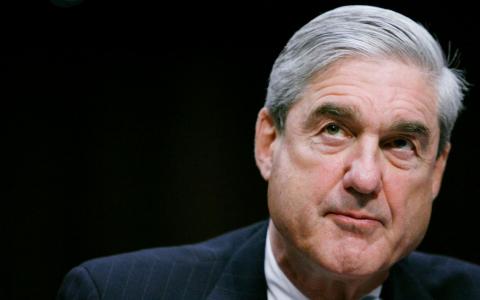
U.S. Special Counsel Robert Mueller unveiled the details of a widespread and coordinated campaign by Russians to influence the U.S. presidential election in favor of Donald Trump, delivering on his initial mandate by the Justice Department.
In an indictment disclosed in Washington on Friday, Mueller describes a sweeping, years-long, multimillion-dollar conspiracy by hundreds of Russians aimed at criticizing Hillary Clinton and supporting Senator Bernie Sanders and Trump. He charged 13 Russian nationals and three Russian entities and accused them of defrauding the U.S. government by interfering with the political process.
The Internet Research Agency, a Russian organization, and the defendants began working in 2014 to interfere in U.S. elections, according to the indictment. They used false personas and social media while also staging political rallies and communicating with “unwitting individuals” associated with the Trump campaign, it said.
The documents point to a broader conspiracy beyond the pages of the indictment, saying the grand jury has heard about other people with whom the Russians allegedly conspired in their efforts.
Mueller’s office said that none of the defendants was in custody. The president has been briefed on the indictment, the White House said.
In a Feb. 10, 2016, planning memo, the Russians were instructed to “use any opportunity to criticize Hillary and the rest (except Sanders and Trump -- we support them).”
The operations also denigrated candidates including Ted Cruz and Marco Rubio, Trump’s rivals in the 2016 Republican primary, the indictment said.
The efforts included contact with “unwitting” Trump campaign officials, with the goal of “impairing, obstructing, and defeating the lawful government functions” including the election.
The group bought advertisements on U.S. social media, created numerous Twitter accounts designed to appear as if they were U.S. groups or people, according to the indictment. One fake account, @TEN_GOP account, attracted more than 100,000 online followers.
The Russians tracked the metrics of their effort in reports and budgeted for their efforts. Some traveled to the U.S. to gather intelligence for the surreptitious campaign, according to the indictment. They used stolen U.S. identities, including fake driver’s licenses, and contacted news media outlets to promote their activities.
In September 2016, the group ordered one worker to “intensify criticizing Hillary Clinton” after a review found insufficient anti-Clinton activity.
The effort went well beyond social media. The Russian effort included organizing rallies for Trump and paying Americans to participate in them or perform tasks at them. One American was paid to build a cage on a flatbed truck; another was paid to portray Clinton in a prison uniform.
The outreach from the Russians included contacts with over 100 Americans.
Rallies were promoted with Facebook ads. Paid ads included this one on Oct. 19, 2016: “Hillary is a Satan, and her crimes and lies had proved just how evil she is.”
After the election, the group organized both pro- and anti-Trump rallies, including a “Trump is NOT my President” rally in New York the week after the election and one in Charlotte, North Carolina, the following week.
The Russian organization had settled on Trump as their favored candidate by at least April 2016 and began producing and purchasing ads promoting the reality-TV star to voters and “expressly opposing Clinton,” according to the indictment.
In June 2016, the defendants allegedly posed as grassroots activists using the account @March_for_Trump to contact a volunteer for the Trump campaign in New York. The volunteer agreed to provide signs for their “March for Trump” rally, according to the indictment. By August, the accused Russians were communicating with unwitting Trump campaign staff involved in local community outreach to discuss their fraudulent “Florida Goes Trump” rallies.
The alleged conspiracy began in 2014, when the Russians began monitoring groups that use social media sites to influence U.S. politics and social issues, tracking the size of groups and how popular they were with their audiences, according to the indictment.
Several Russians traveled around the U.S. to gather intelligence for their operation, posing as U.S. political and social activists. They used clandestine methods to communicate and gather information, employing special cameras, “drop phones” and “evacuation scenarios” to ensure security.
The Russians set up Facebook and Instagram groups with names that targeted such issues as immigration, religion and the Black Lives Matter movement. They also controlled numerous Twitter groups that appeared to be controlled by U.S. people, such as “Tennessee GOP.”
They spent thousands of dollars a month to buy advertisements on social media groups, while carefully tracking the size of U.S. audiences they reached, according to the indictment.



